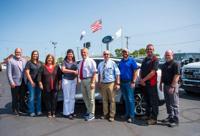INA, IL (WSIL) — A meaningful donation to the Rend Lake College Foundation will help students enrolled in the school’s automotive program.
The Rend Lake College Foundation announces a partnership with Roy Schmidt at Ford Square of Mt. Vernon. The group was able to buy an electric Ford Mustang vehicle.
This purchase was made using a donation from the late Zola Hutchison to directly benefit the RLC automotive technology program.
The college says the donation is in memory of her late husband, Claude Hutchison, an esteemed auto mechanic who passed away in June 1995.
Zola Hutchison has made a generous donation to the RLCF. Her wish was to direct their planned gift towards enhancing and advancing the automotive curriculum at Rend Lake College.
Amy Newell, Assistant Director of Development, touches on what this donation and partnership mean to the program.
“This magnanimous support between these two donors, Zola Hutchison and Roy Schmidt of King City Ford will significantly benefit the automotive department at RLC,” says Newell. “It ensures that future students receive top-notch education and training in automotive technology, including the burgeoning field of electric vehicles.”
Schmidt, owner of Ford Square, is equally excited about this collaboration and what it means to students.
“The partnership between King City Chrysler Center, Ford Square of Mt. Vernon and Rend Lake College has been a great way for us to support our community,” explains Schmidt. “With this electric Mustang, the automotive students will be able to get hands on electric vehicle training, which will be used in their future careers.”
The college has been awarded the Rev Up Grant, a state-funded grant from the Illinois Community College Board, to purchase supplies and equipment that will broaden educational opportunities for local students.
RLC’s Automotive Technology program will expand its curriculum to include instruction on passenger and light-duty electric vehicles (EVs), introducing students to emerging EV technology. The Bureau of Labor Statistics reports that mechanics must increasingly obtain formal training due to the rapidly advancing complexity of automotive technology.
This is especially true for electric vehicles, which feature unique electrical systems, drivetrains, and batteries distinct from conventional vehicles. As a result, current workers need regular training to maintain skills aligned with the latest advancements.
The faculty and administration are committed to exploring ways to advance the development of electric vehicle (EV) learning opportunities. They have visited various sites to learn more about the grant, tour labs, and explore new automotive technologies.

